A central purpose of the J. Reuben Clark Law Society is to engage in service to those who are less fortunate. Membership in the Law Society can benefit attorneys by renewing our motivation to serve, encouraging coordinated effort, and sharing ideas and resources. The Law Society is grateful for the example of Chapters and attorneys across the world who exemplify its standards. We hope that sharing these examples will encourage participation in the Society and expand our influence for good.
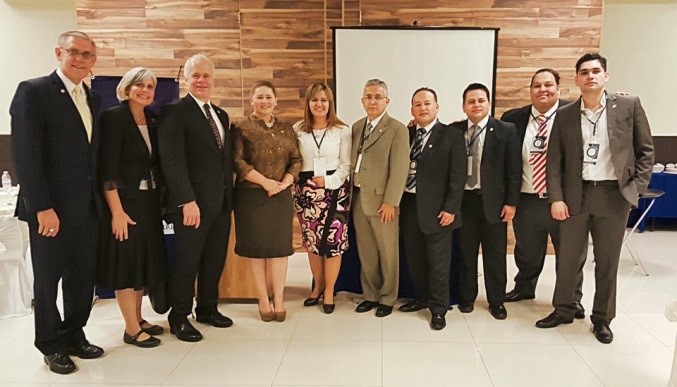
Soon after the JRCLS Monterrey, Mexico chapter was organized in 2016, Chapter leaders addressed an LDS Area Seventy and Presidents from twelve LDS Stakes to explain the JRCLS pro bono legal services program. The Chapter now offers a pro bono clinic on the last Saturday of each month.
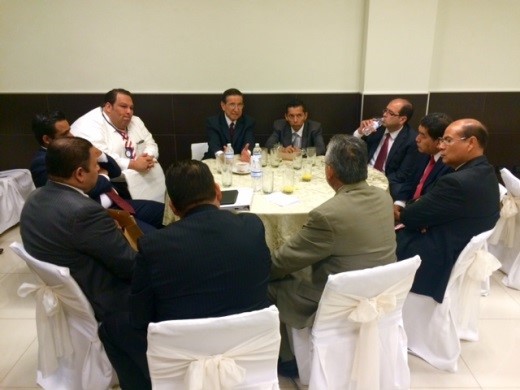
Individuals are referred to the clinic by their bishops, who were taught about the program by their stake presidents. In the clinics, JRCLS members assist with consultations in legal areas such as family, business, criminal, and immigration law. For more information, contact Monterrey Chapter President Ricardo Thompson: ricardo@thompsonabogados.com
Beginning in March of 2015, the JRCLS Chapter at the University of Utah’s S.J. Quinney College of Law has taken a leading role in staffing the Salt Lake Community Legal Clinic (formerly called the Immigration Clinic). Law students at the Clinic conduct intake interviews and assist volunteer attorneys recruited through the JRCLS Salt Lake City Chapter in answering questions related to Immigration, Family Law and general legal issues. The clinic is held the first Tuesday of every month from 5:00 to 6:30 p.m. at the LDS Employment Center, 780 West 800 South, Salt Lake City, Utah.
If your chapter is interested in learning more about the student chapter’s involvement, or how your chapter can perform similar service, please contact: JoLyn Spruance, University of Utah Pro Bono Director, jolynn.spruance@law.utah.edu (801) 581-5418, or Taylor Smith, Student Chapter President, taylor.j.smith@law.utah.edu (702) 306-7825.
View a video report from University of Utah law student Ashley Anderson here.
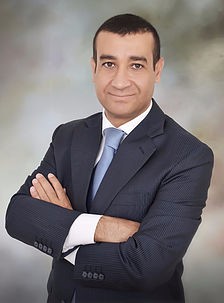
Samer Pharaon, a 1997 BYU LLM graduate now practicing in the United Arab Emirates, has performed volunteer work with the International Refugee Assistance Project. As an Arabic speaker, Samer was able to interview individuals who had applied for refugee status from Iraq, Sudan and Egypt. He investigated their claims regarding the circumstances in their home country, their family circumstances, and threats of physical danger including torture or rape. Many applicants reported that they had worked with the U.S. military as translators or in other capacities, and had been harassed and threatened because of that assistance. Some applicants had family members already in the United States. Samer presented written reports of his investigation to IRAP’s attorneys in New York City, who prepared applications and appeals. For more information, contact Samer here. Attorneys interested in taking cases from IRAP can volunteer here.
JRCLS Chicago Chapter board member Rebecca Van Uitert, who is Pro Bono director for her firm, Fragomen, spent a week during 2016 volunteering at the U.S. Immigration and Customs Enforcement (“ICE”) family refugee detention center in Dilley, Texas. There she and a team of 16 other volunteers from her firm a week preparing female refugees from Central America for their asylum hearings, known as “credible threat” hearings. For more information, contact Rebecca here: rvanuitert@fragomen.com
Cary Jensen is a JRCLS member in Rochester, New York. He also traveled to the Dilley, Texas detention center to assist detainees in 2016.
View video reports by Rebecca van Uitert and Cary Jensen.
These attorneys’ service at the Detention Center was performed through CARA, a coordinated program established by several refugee service agencies.
Two BYU law professors, Kif Augustine-Adams and Carolina Nunez, have also worked with refugees in the Dilley detention center. Augustine-Adams described how she met her first clients: “Two 14 or 15-year old girls came into the trailer with their mothers. They looked just like my teenage daughters, their long hair wrapped up into buns on the tops of their heads. But they were fleeing violence I wouldn’t wish on anyone: fleeing rape by gangs, extortion, the possibility of being captured by gangs for use as sex slaves. Meeting those girls made every minute I spent at the facility vitally important.” BYU Law School has now established an externship program for its students at Dilley.
Jim McConkie and Bradley H. Parker, members of the Salt Lake City JRCLS Chapter, formed the Utah Refugee Justice League in 2016 as a non-profit organization to defend the rights of refugees who have been discriminated against on the basis of religion, ethnicity or national origin. The League was formed in response refugees who reported being threatened with removal of their headscarves (hijabs), accosted with profanities, being physically threatened, bullied in school or harassed at work by co-workers; and menaced by strangers in public places. Others have reported having graffiti or pigs blood sprayed or smeared on their property. The League intends to teach classes and speak to groups of refugees to help them better understand and appreciate their rights in America. Learn more about the Refugee Justice League here.
In May of 2017, Yussuf Awadir, the Imam at Salt Lake City’s Madina Islamic Center Mosque and an American citizen since 2010, was stranded at the International Airport in Nairobi, Kenya. He had arranged to travel to Kenya to pick up his wife and children, but Qatar Airlines refused to allow him to enter the United States and barred him from boarding his return flight to Salt Lake City with his wife and children, who have U.S. passports or travel visas. JRCLS member Jim McConkie knew Imam Yussuf Awadir personally. Several lawyers from the Refugee Justice League became involved, and Abdi was able to fly back to the U.S. with his family.
Carrie Akinaka is a law student and board member of the UCLA Law School JRCLS student chapter. She has volunteered with the International Refugee Assistance Project (IRAP), which “organizes law students and lawyers to develop and enforce a set of legal and human rights for refugees and displaced persons.” In 2017, Carrie assisted IRAP attorneys working to help an Iraqi man join his family in the United States, who had previously been granted refugee status. For more information, contact Carrie here: akinaka2018@lawnet.ucla.edu
View a video report from Carrie Akinaka here.
Many law schools have organizations focused on refugee service. If your chapter has a nearby law school, the school would likely welcome assistance from JRCLS volunteers, whether or not it has a JRCLS student chapter.
In October of 2016, the Chicago JRCLS chapter participated in a pro bono clinic to help refugees complete their applications for United States citizenship. The chapter partnered with a faith-based group called World Relief that is experienced in citizenship applications, and held the event in a Lutheran Church in West Chicago. Prior to the event, World Relief trained the JRCLS attorneys to fill out USCIS Form N-400, the lengthy and complicated application for U.S. naturalization which takes about 45 minutes to complete. The clinic was held in two shifts in the morning and afternoon, helping applicants from Central and South America, Iran, Pakistan and India. It costs World Relief $200 per person to process these applications.
The Chicago chapter set out to raise a total of $10,000 in order to help 50 people apply for citizenship. Raising funds both within and outside the chapter, they ultimately doubled their goal, raising sufficient contributions to process applications for 100 people.
For more information, contact Rebecca Van Uitert, Chair-elect of the Chicago Chapter, here: rvanuitert@fragomen.com
Jill Jasperson, a member of the Central Utah Chapter who also serves on the JRCLS Media Committee, launched the first free legal clinic at Utah Valley University in 2009. In connection with the ABA’s Pro Bono Celebration, she recruited 22 attorneys to provide service to walk-in clients in Utah Valley, who were surprised when approximately 150 clients arrived seeking help. Jill continued to operate and expand the clinic until 2014, when the Timpanogos Legal Center was initiated in Provo. Most clients brought domestic or landlord-tenant issues; the attorneys were usually able to resolve their concerns or refer them to the appropriate organizations for longer-term help.
In May of 2014 the Brazil Northeast Chapter, led by Chapter Chair Aroldo Cavalcante, partnered with the local State Prosecutor to provide pro bono legal service to elderly individuals who were not receiving legally required support from their children. Chapter members interviewed individuals referred by the Prosecutor to determine whether they were subjected to the crime of abandonment, where family members neglect to visit and provide support, or appropriation, where family members improperly use money or resources. Their investigation helped the Prosecutor decide whether legal action was necessary to secure basic food and financial support. By partnering with a government institution, the Chapter showed how Law Society members can take action without planning their own event. Chapter members provided invaluable service to vulnerable individuals, while helping to fairly enforce the law.
Watch a video about this event here. Photos from the service project are below. For more information, contact Aroldo Cavalcante at aroldo@barretocavalcante.com.br
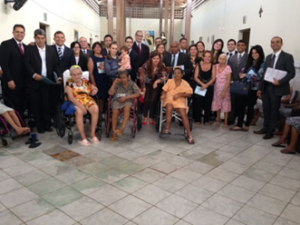
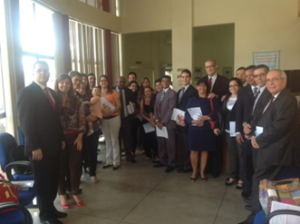
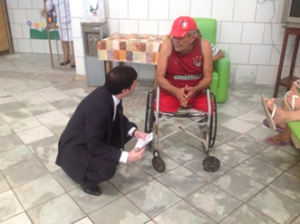
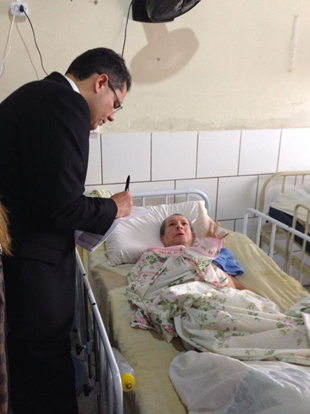
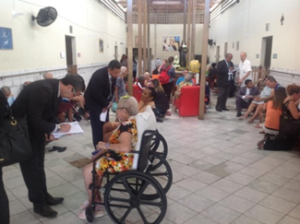
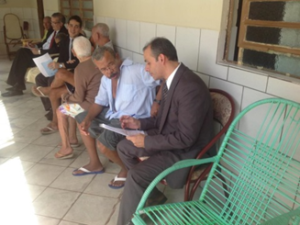
In 2015, the student chapter at the University of Missouri School of Law partnered with a nearby service organization, the Samaritan Center. The Samaritan Center connects individuals with attorneys in the community who can help them on a reduced fee or pro bono basis. For straightforward cases (e.g. an uncontested divorce), volunteers at the Center coach individuals to handle their own matters pro se.
The JRCLS student chapter Chair, Angela Kennedy, arranged for students to assist the Center with client intake and assessment. Despite being several miles from the Clinic, she found that students could work either onsite or remotely. If the students are not able to drive to the clinic, they first complete a two-hour on-site training, after which the Center emails an application for legal services from an individual in need, and the student calls the applicant to gather facts about their legal issue. The student then prepares a memo and submits it to the supervising attorneys, volunteers who are often retired or taking a break from full-time practice to raise children. The volunteers are able to stay involved with the legal community, drawing on and maintaining connections with practicing attorneys, and are able to make a significant impact in people’s lives.
Missouri has a statute limiting malpractice liability for service providers like the Samaritan Center, extending to attorneys who take referrals.
Watch a video about this event here. For more information about the University of Missouri student chapter’s work, contact Angela Kennedy at abkennedy@mail.missouri.edu.
Brent Chipman is a member of the Law Society’s Salt Lake City Chapter, where he has been involved in the Chapter’s pro bono program for several years. The program invites volunteer members to serve clients in need who have been referred to the Pro Bono coordinator, Brian Rothschild. In March of 2015, the Chapter formed a relationship with the LDS Inner City Project, through which LDS members called to the Inner City Mission assist individuals with temporal welfare and help to develop self-reliance. Because Brent specializes in family law, an area in which pro bono service is frequently requested, he has been able to handle numerous cases, including several referred by the Inner City Mission. Additionally, he has mentored attorneys without prior family law expertise, in order to help them competently handle these cases. Due to the work of many current and former Chapter members like Brent and Brian, the Salt Lake City Chapter was awarded the Franklin S. Richards Award for 2015.
For more information about the SLC Chapter’s work, contact Brent at bchipman@comcast.net, or Brian at BRothschild@parsonsbehle.com.
Cleveland, Ohio chapter member David Tryon has always drawn inspiration from the sign in front of Brigham Young University: “Enter to Learn, Go Forth to Serve.” While practicing in commercial litigation and appeals in Ohio and other states, David has served his community in several elected and appointed positions — on the Board of Zoning Appeals , as member and President of the School Board, and on the Greater Cleveland Council of the Boy Scouts of America Board. After becoming known in the community, he was asked to chair the BSA parade committee in 2013- a challenge for a litigator without any experience running parades! He proposed that the Scouts join the St. Patrick’s Day parade, a significant community event seen by thousands. Working with the community and various scouting groups, 1,000 scouts ultimately marched in the event; the next year, 1,600 marched.
In the Cleveland Chapter, David and others also help Law Society members to defend and promote religious liberty. At Law Society luncheons, members often review published articles and cases related to religious freedom, and discuss ways that members can become involved in their community, and use their influence with conviction and civility.
For more information about the Cleveland Chapter’s work, contact David at dtryon@porterwright.com
In 2014, under the leadership of Area Legal Counsel Brent Belnap, a small group of LDS attorneys in the Moscow area founded the Moscow chapter of the Law Society. Denis Smogluck and Vladimir Mochalov, who work in the LDS Office of Legal Counsel, were the founding officers. The Chapter sent a letter to the LDS Church leaders in the area announcing the formation of the chapter and inviting them to refer interested attorneys to the Chapter. One of the first responses the Chapter received was a request for help from an LDS bishop in a town a number of miles away from Moscow. An individual in his community had been forced to close his businesses in several towns, and he faced financial ruin. The Bishop requested assistance with bankruptcy proceedings. None of the members of the new Moscow chapter were experienced with bankruptcy law, but they were determined to help. Denis located bankruptcy counsel in several cities, explained the individual’s predicament, secured their assistance, and followed up over a period of several months until the proceedings were resolved.
For more information about the Moscow chapter’s service, contact Denis at smogluckdg@ldschurch.org
Shannon Sperry is a board member of the Law Society’s Puget Sound (Seattle) Chapter. As Shannon and her Chapter searched for opportunities to serve, they decided to organize a traveling legal clinic. Each year, Shannon and other Chapter members have visited a different location within their Chapter – recent locations have included Everett, Tacoma and Seattle. After alerting the local LDS membership, the clinic has been held on weekends in an LDS meetinghouse. The clinic begins with speakers who explain the legal system, after which volunteer attorneys spend 20 minutes meeting one-on-one with local individuals in need of legal guidance. The Chapter volunteers learn about the legal resources available in each area, and are able to direct them to those resources, including attorneys who may be able to assist them by taking on formal representation. Shannon and her fellow Law Society members feel that they are able to provide useful guidance and emotional support to individuals who have otherwise felt overwhelmed by their problems.
Watch a video about this story here. For more information, contact Shannon at sperry@lasher.com.
Paul Hoffman is a member of the Law Society’s Orange County Chapter. In addition to maintaining a business litigation practice. Paul has provided pro bono legal service to several private foundations and non-profit groups in defense of their right to exercise religious liberty. His work has recently included submission of an amicus curiae brief to the United States Supreme Court, through the Individual Rights Foundation in Los Angeles, supporting the right of the Boy Scouts of America to select scoutmasters who support the organization’s moral values.
For more information, contact Paul at pahoffman@ghlaw.us.
The JRCLS Los Angeles Chapter’s pro bono program has partnered with the LA chapter of Bet Tzedek and Public Counsel beginning in 2011. The chapter sent letters to local church leaders explaining the program, and inviting them to contact Brian if they are aware of individuals in need. Once a church leader contacts Brian, he submits the potential client to Bet Tzedek or Public Counsel. If the client qualifies for their assistance, Brian seeks a volunteer attorney among LA JRCLS members. The volunteer is then able to take the case from the legal aid group, which helps to qualify the case with the volunteer’s firm for conflict check and malpractice purposes. The chapter has handled around 15 cases using the system from 2011 through 2013.
If your chapter is interested in learning more about the L.A. program, please contact any of the following:
Blaine Evanson
Gibson Dunn & Crutcher
BEvanson@gibsondunn.com
Levi Heath
310-284-3890
levi.heath@BTLaw.com
leviheath@gmail.com
Brian M. Rothschild
Parsons Behle & Latimer
801.536.6762
brothschild@parsonsbehle.com
In October of 2012, a Bishop in the Pasadena Stake referred a pro bono matter for immigration assistance. The couple were married in the L.A. Temple in August 2012. The wife, a U.S. citizen, was undergoing chemotherapy. The husband, a returned missionary (U.K citizen born in Kenya) entered the U.S. in 1995 and overstayed for the past 18 years. He was not able to hold a regular job because he had no documentation. A JRCLS L.A. Chapter member , Michael Fehmel, handled the matter for no fee. He attended the immigration interview with them in August, 2013, at which time the husband’s permanent U.S. residence status was granted, just in time for the husband to start a new job.
T. Michael Fehmel
4550 Wilshire Blvd
Los Angeles, CA 90010-3801
Tel (323) 933-2525
Fax (323) 933-2740
Members of the Los Angeles Chapter gathered on Saturday, June 11th, 2011 for a day of service at the local Bishop’s Storehouse. The event was sponsored by the Women in the Law Committee. Over 20 chapter members, spouses, and children turned out in support.

The purpose of the Bishops’ storehouses is to distribute commodities to the poor and needy as requested by bishops. The storehouses also provide meaningful service opportunities for those receiving assistance and for those desiring to serve missions or to volunteer.
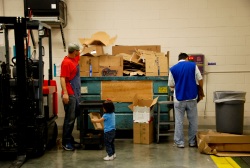
The storehouse was overwhelmed with so many volunteers from the local JRCLS chapter, some of them ended up going across the street and helping out at the Deseret Industries store. At the storehouse, volunteers stocked shelves, broke down boxes and recycled them, weighed fresh product and put it in bags, helping out in the canning process, and other activities.
Nancy Allred says about the day, “It was a really good experience, and I think humbling for many. A lot of lawyers live in a pretty rarefied world and getting up close and personal with some of these problems was a really good reminder.”
After helping out for a few hours, the chapters members went to a local favorite restaurant, King Taco, discovered by the Los Angeles chapter president, Terry Highams, when he served his mission in Los Angeles.

First picture: Christopher Higham and Kanji Takahashi stock shelves with Sam Petty, a 1L at USC
Second picture: Brad Allred, Lia Allred (age 2), and Kanji Takahashi break down boxes.
Top Left: Jeff and Kelly Stephens canning.
Top Right: Brad Allred and JRCLS Chapter Secretary Heather Takahashi stock shelves.
Center Right: Ladell Muhlestein weighs and bags produce for the produce bins.
Bottom Left: A huge pallet of green beans waiting to be stocked.
Bottom Center: Chapter President Terry Higham (in blue vest) chats with Brad Allred as Terry’s son checks out the forklift.
Bottom Right: Brad Allred and daughter Lia (age 2) break down boxes.
Robert Faulk has been the Orange County Pro Bono Chair since 2010. The Orange County Chapter sends a letter to local Church leaders inviting them to contact Robert regarding members in need of free or reduced-fee legal services. Several Orange County attorneys, who specialize in areas for which such services are often needed, have agreed to act as supervising attorneys, assisting Robert or other attorneys who are willing to provide help. In the last couple of years, with the help of supervising attorneys in family law (Dan Hunter) and immigration (Aggie Dolinska), Robert has been able to provide pro bono service to a number of LDS clients and others:
LDS Members
Non-Members
Eric Baxter, an attorney in the Mid-Atlantic Chapter, spent several years working on a pro bono basis with the Becket Fund for Religious Liberty, a non-profit, public-interest legal and educational institute with a mission to protect the free expression of all faiths. Eric’s pro bono work eventually led to a full-time job with the Becket Fund, where he continues to work on important religious liberty matters.
Eric has also worked on a number of pro bono cases helping foster parents and extended family members adopt children out of the DC foster system. In 2007, he was awarded the Albert E. Arent Pro Bono Award for his work.
Eric is available to provide more information about getting involved with the Becket Fund or other religious-freedom groups, or about pro bono adoption work:
Eric Baxter, Becket Fund for Religious Liberty
ebaxter@becketfund.org | 202-349-7221
Standing tall in the legal community, the Timpanogos Legal Center (TLC) represents a group of BYU law students, attorneys and other volunteers who have come together to serve members of the community in need of legal advice and assistance. Living up to their mission of “lifting lives through the law,” this pro-bono organization offers consultation clinics every Tuesday evening and a special document clinic once a month. The TLC works in partnership with Utah Legal Services and the Family Justice Center, providing free walk-in clinics at the Health and Justice building in downtown Provo.
Richard Sheffield, former Chair of the JRCLS Utah Central Chapter and President of the TLC, helped found the organization in 2010. “I’m doing this because I care about reaching out to the neediest in my community,” Sheffield said. “Looking for an opportunity to do good has made me find more fulfillment in my own legal practice.”
In addition to the volunteer attorneys, the TLC has recruited over 100 student volunteers. “Students should get involved because it is the right thing to do,” said Camille Borg (3L), current president of BYU Law School’s Public Interest Law Foundation. “Lawyers have a responsibility to help lift lives through the law.”
The TLC is modeled after the Southern Utah Community Legal Center in St. George, an effort initiated by the Southern Utah Bar Association. With the help of organizations like And Justice for All and Utah Legal Services, volunteers have handled dozens of cases since its founding.
Founded as a beacon organization people could look to for help, the TLC received its name from the near 12,000 foot mountain that stands as the second highest peak on the Wasatch Front. “We wanted to convey an image of lifting your eyes up to Timpanogos,” Sheffield said. “Pro-bono service is a blessing not only to the people who receive the service but to those who give. There is an uplifting feeling experienced by those who give the service that is real, that makes you enjoy the legal practice more and helps you be even more effective in legal practice.”
Since the first kickoff meeting in October 2010, the TLC has grown to hundreds of volunteers, including over 70 volunteer attorneys, many of whom are retired attorneys, stay at home mothers and recent graduates looking for work experience. “The TLC has identified and invited participation of unique groups of inactive status attorneys,” TLC co-founder and current BYU Law Professor Jim Backman said. “We call this group our TLC Team of attorneys and we have had more than 40 step forward to be involved in ways permitted by newly established Bar Association rules for inactive attorneys to assist on pro bono matters.”
Susan Griffith serves as one of the licensed attorneys at the clinic in addition to being a part-time professor at the BYU Law School. As executive director of the TLC, she also helped organize the TLC team of volunteer attorneys and students. “I love the part about giving our stay at home mothers a chance to do important community service work.” Professor Griffith said. “This program gives these really talented women the opportunity to primarily do work at home while at the same time providing an outlet to use their professionally trained skills.” The committee works hard to see that their efforts not only deliver legal services to those in need, but also to find ways to help clients become more self-reliant. “We want to help clients develop character in the way they approach their problems,” Sheffield said, “We are not just delivering legal services but we are lifting them and their lives through the law.”
Members of the TLC Board are available to provide more details about the program and to advise your Chapter on adapting elements of the TLC in your area:
Susan Griffith – Executive Director of TLC, Adjunct Professor, BYU
(801) 422-3947 | griffiths@law.byu.edu
Richard Sheffield – JRCLS Central Utah Chapter
(801) 426-8200 | rsheffield@fslaw.com
Jim Backman – J. Reuben Clark Law School
(801) 422-2221 | backmanj@lawgate.byu.edu
Jill Jasperson – UVU Legal Studies Program
(801) 863-8856 | jillj@uvu.edu
The JRCLS Atlanta Chapter established a Heritage Public Service Project in 2005, to enable children of LDS heritage in the Atlanta metropolitan area who are placed in foster care to continue to receive the benefits of that heritage, most often by being placed into LDS foster care homes.
The Chapter found that generally from two to ten children of LDS parentage were removed each year from the custody of their parents (voluntarily or involuntarily) and placed in foster care. They often found themselves in an environment where they were denied their LDS heritage because their foster care situation did not permit attendance at primary activities, contact by home teachers or ecclesiastical leaders, family or personal prayer, or other aspects of their LDS heritage and beliefs. Although LDS Family Services is active in the Atlanta area, it focuses primarily on placing newborn babies into foster care, and had not emphasized placement of older children. The 50-member Atlanta Chapter, working with LDSFS, the Georgia Department of Family and Children’s Services, and local LDS leaders, set out to identify LDS homes qualified to receive foster children, develop an emergency action plan to enable case workers to immediately place LDS heritage children into LDS homes, identify a First Responder to facilitate the child’s placement, and cooperate with other faith-based organizations to work toward common goals.
Read more about the Atlanta Chapter’s project here.
For more information, please contact:
Billie Howick
(770) 985-2516
Steven Hardy
(770) 399-9500
shardy@fh2.com
Volunteers of the J. Reuben Clark Law Society, Northeast Brazil, provided legal assistance to citizens in the city of Cabo de Santo Agostinho / PE during the month of June 2013 as part of “The Law and Society” event. The service was held in the space provided by The Church of Jesus Christ of Latter-day Saints. Eighteen lawyers participated as well as two law students and other supporters. The action took place in partnership with the City General Attorney.
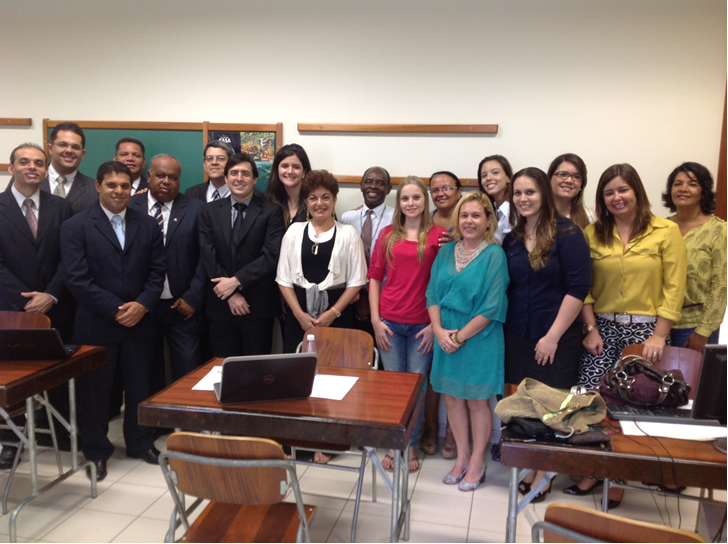
Some of the services provided included:
The goal was to provide guidance to legal referrals and petitions to which local citizens would not normally have access. By taking the law to the local population, this pro bono project undoubtedly eased the anguish and suffering of many people in need.
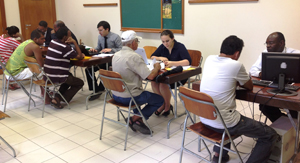
Dr. Aroldo Cavalcante, one of the coordinators said, “We want to highlight the importance of having a religious belief to truly ingrain ethical values of a profession in law. So, dealing with pro bono activities, we expect to hold up to three annual events to cement these principles.”
The J. Reuben Clark Society’s members are lawyers or law school graduates who support the mission of this Law Society: “We affirm the strength brought to the law by a lawyer’s personal religious conviction. We strive through public service and professional excellence to promote fairness and virtue founded upon the rule of law.”
There is no membership fee or annuity payment to participate in the JRCLS, and may include law students and other members associated. Cavalcante further explains, “All faiths are welcome. There is no requirement regarding religious preference, state bar membership, attorney status or attendance at J. Reuben Clark Law School. Graduation from a law school and support of the mission statement are the only requirements for membership.”
Below is the English translation of a report on some pro bono activities of the Brazil Northeast Chapter, sent in the Spring of 2013 by Aroldo Cavalcante and Silvio Guimaraes: “Per your request, I would like to briefly share three pro bono cases performed by the Northeast Chapter of JRCLS in the recent months, as we started this important work for Church needy members who have no ability to hire a lawyer.
1st case: Inventory and partition of the only realty of a widow. We were contacted by a very humble widow, who resides in the metropolitan area of Recife, reporting that she had filed a petition for the inventory and petition of a very simple house left by her deceased husband more than 20 years prior to the date. After examining the process at the courthouse, we untangled the main documents and, since all the heirs were of age and capable, we made, by express legal provision, the necessary inventory and the partition at the notary through a Public Title. When that sweet widow received, in such short period of time, the Deed for her house she said: ‘Counsel, it only took you one month to obtain something I have been desiring for more than 20 years!’
2nd case: Elderly Brazilian retirement benefits. A dear friend came to us to express his concern about his age and how he needed to keep working sustain his home and because he was not able to participate in the Government Program of Retirement, even after being a contributor to the program for the last 37 years. We examined and organized his labor documents and information about years worked and value of contributions. After only two meetings with the Retirement Officials, there it was no doubt he was entitled to the benefits. With a lot of gratitude, the elderly man told us: ‘Bishop, the government official told me that in two months I’ll be able to receive my retirement payment every month. How can I pay for the service you rendered me?’
3rd case: Alimony for a child. A less active woman came to us, through an active family, informing she had been beaten by her husband for more than 8 years (properly confirmed through unbelievable pictures), and she had a daughter completely scared with the father’s violence. She did not have courage to divorce him but also understood she could be murdered anytime unless some action was taken. We were able to conduct a settlement before the Public Ministry, and the husband left the modest home and accepted the responsibility to monthly pay alimony to his daughter. The woman, without stopping crying, could only say: ‘You saved my life . . . ‘
“Naturally, we have cases far more difficult to solve, some really hard and some we will never hear about. However, the ‘success stories’’only show that without a lawyer involved, answers to some legal questions and dilemmas may take more than 20 years to be found. Certainly, it’s been a learning experience for all of us, in every sense, as we use part of our professional time on behalf of our less favored brothers and sisters!”
On August 15, 2007, a devastating earthquake rocked the Peruvian towns of Chincha, Pisco and Cañete. The homes of thousands of families were immediately reduced to rubble. The LDS Church and others groups sprang into immediate action to deliver vital relief to the destitute victims of this tragedy. As the dust began to settle, it was obvious that a long-term solution would be needed for those who had lost their homes.
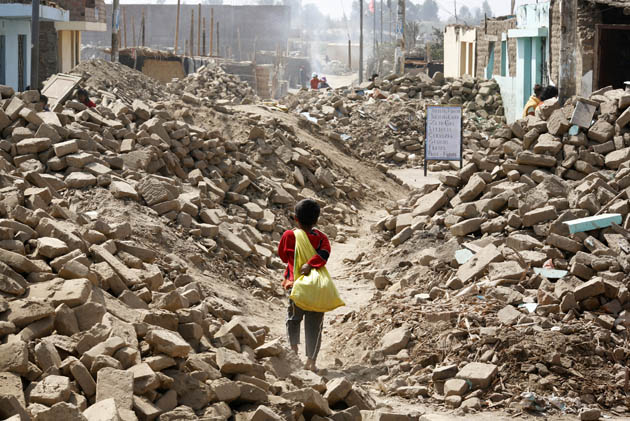
The LDS leadership for the South America North Area (Area Presidency and Director for Temporal Affairs), with Salt Lake City headquarters approval, launched a massive project to rebuild the homes for those whose had lost them by this devastating earthquake. However, to qualify for this tremendous blessing, the affected families would need to demonstrate they had either clear title or legitimate possession to the land they had been occupying, which was a daunting task for many of these humble families.
The Area Legal Counsel of the Church in Lima, Felix Gil, and his staff called upon the Lima Chapter of the Law Society to provide legal assistance to the affected families. At a prearranged time, five members of the Lima Chapter, along with the Area Legal Counsel and his staff, traveled to one of the destroyed cities to meet in a chapel with each of the families who had been selected to have their home rebuilt by the Church, in order to review the status of their respective title situations. The Law Society members were able to review their documentation and provide specific guidance on any remaining documentation that might be required (e.g., building permits from municipal authorities).
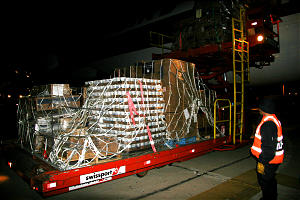
This pro bono legal service by the Lima Chapter of the Law Society was a tremendous blessing to many families. It enabled them to receive the timely humanitarian assistance that was so generously provided by the Church in the rebuilding their homes and their lives in the aftermath of such a devastating earthquake. Approximately 400 homes were rebuilt by the Church in these affected cities, and the J. Reuben Clark Law Society is part of this legacy.
Area legal counsel Greg Clark describes recent events in Chile:
“A little background information will be necessary to understand what Fernando and the Santiago Chapter were able to accomplish in Chile. Until a number of years ago, divorce was not permitted in Chile, which was particularly tragic for those whose lives were ruined by abusive or unfaithful spouses. Therefore, when a marriage failed (for whatever reason), affected spouses would often abandon the failed relationship and restart their lives with a new companion, notwithstanding they were still legally married to their original spouse. You can imagine the moral and legal mess this created, especially when children were born into the new relationships.
“For a period of time, the First Presidency granted the Church in Chile an exception to the normal rule that required couples to be duly married prior to being baptized, provided they were otherwise qualified for baptism, given the legal impossibility of obtaining a divorce in Chile. Of course, these couples could not be sealed in the temple since they were not legally married to their new companion, which was a legal impossibility in Chile. However, a number of years ago, Chile finally passed legislation that allowed for divorce, and when that occurred the First Presidency rescinded the aforementioned exception. The newly established Family Courts, authorized to effectuate these divorces, were instantly inundated with couples trying to put their lives in order, which created a legal morass that was difficult to navigate without competent legal counsel. This new legal right to obtain a divorce in Chile would enable thousands upon thousands of families to put their lives in order to obtain the full blessings of the temple.
“Our Chapter Chair in Santiago, Fernando Ocampo, offered the pro bono services to the Chile Santiago North Mission to assist its investigators to navigate the legal obstacles associated with the Family Courts so that these investigators could put their lives in order and obtain the blessings of baptism and, ultimately, the full blessings of the temple.
“Special thanks are in order to Fernando Ocampo and the Santiago Chapter of the JRCLS for their dedicated service in blessing the lives of thirty families so far, and many others they will bless in the future.
“Once again, we are seeing how dedicated members of a Chapter of the JRCLS can be a real blessing to the community where they live, if they are willing to serve others with their legal skills.”
For tips on how you or your chapter can engage in similar service, and to share examples of service performed by members of your chapter, please contact the Service and Outreach Committee, or email rick@shieldslawoffices.com.